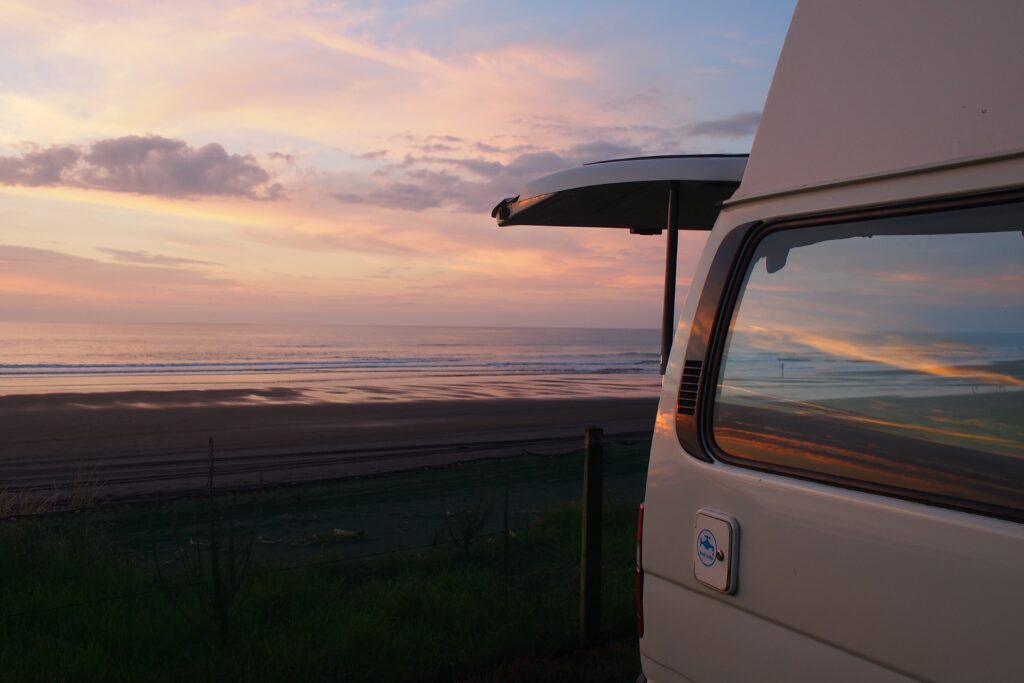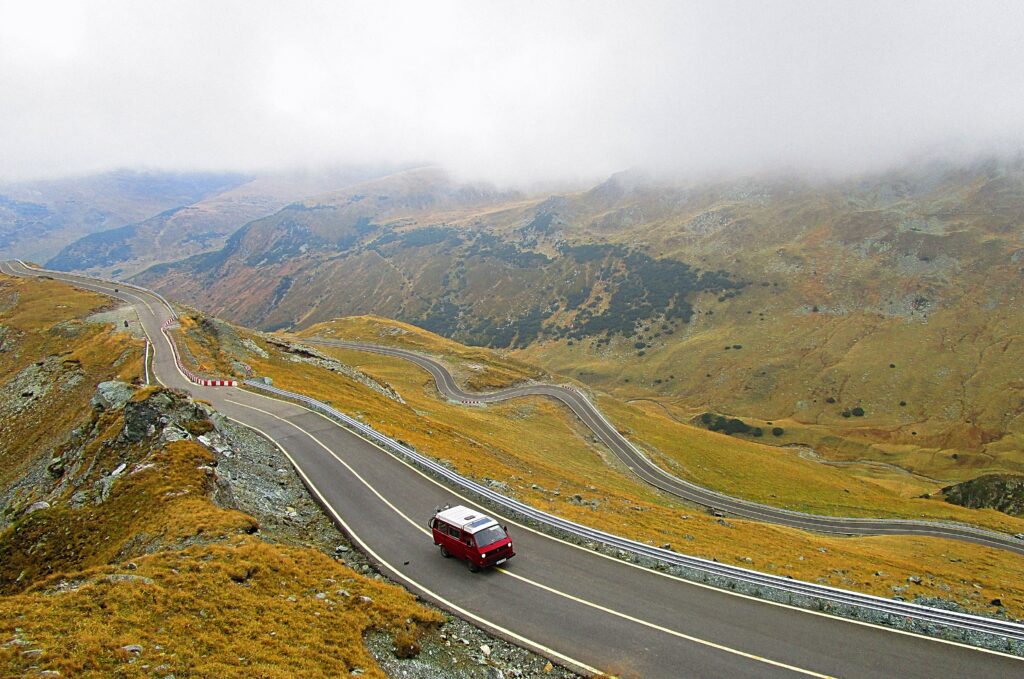Can You Retire In A Camper Van? That’s a question many people are asking these days. In this article, we’ll explore the possibilities and challenges of retiring in a camper van. From the financial aspects to the lifestyle adjustments, you’ll discover everything you need to know about this unconventional retirement option. So, if you’ve ever dreamt of hitting the road and living a nomadic life in your golden years, keep reading to find out if retiring in a camper van is a viable choice for you.

Benefits of retiring in a camper van
Retiring in a camper van offers a range of benefits that can enhance your retirement experience. From the freedom to travel and explore to the cost-effective living and minimalist lifestyle, retiring in a camper van can provide a unique and fulfilling retirement journey. Let’s explore some of the key advantages of this lifestyle choice.
Freedom to travel and explore
One of the greatest advantages of retiring in a camper van is the freedom it provides to travel and explore. With a camper van, you have the ability to go wherever you desire, without being tied down to a specific location or property. Want to see the Grand Canyon? Park your camper van nearby and wake up to picturesque views every morning. You can easily visit multiple destinations, experience different landscapes, and embark on new adventures, all at your own pace.
Cost-effective living
Retiring in a camper van can be a cost-effective way to live during your retirement years. Traditional retirement living options such as mortgages, rent, and property taxes can be a significant burden on your retirement savings. By downsizing to a camper van, you can eliminate or drastically reduce these costs. You can save money on rent or mortgage payments and use that extra cash for travel, experiences, or enjoying your retirement to the fullest.
Minimalist lifestyle
Living in a camper van encourages a minimalist lifestyle. With limited space, you are compelled to declutter and downsize your possessions. This can be liberating, as it allows you to focus on what truly matters and let go of materialistic attachments. Living a minimalist lifestyle can bring a sense of tranquility and contentment, as you enjoy the simplicity and freedom of having fewer belongings to worry about.
Connection with nature
Retiring in a camper van allows you to be closer to nature as you explore different landscapes and outdoor destinations. You can wake up to breathtaking views, go hiking in national parks, or enjoy the tranquility of a beachside campsite. The close proximity to nature can promote a sense of wellbeing and improve overall mental and physical health. It offers the opportunity to reconnect with the natural world and appreciate its beauty in a profound way.
Considerations before retiring in a camper van
While retiring in a camper van can be an exciting and fulfilling adventure, it is important to carefully consider certain factors before making this lifestyle choice. These considerations include financial planning, logistics of living in a small space, maintenance and repairs, as well as healthcare and insurance.
Financial planning
Before retiring in a camper van, it is crucial to evaluate your financial situation and plan accordingly. Consider your retirement income, savings, and potential costs associated with living in a camper van, such as fuel, maintenance, insurance, and campground fees. Create a realistic budget to ensure that your retirement funds can adequately support your desired lifestyle.
Logistics of living in a small space
Living in a camper van requires adjusting to a significantly smaller living space compared to a traditional home. You need to be comfortable with the limited room for belongings, including clothes, kitchenware, and personal items. Downsizing and decluttering before transitioning to a camper van lifestyle can help you navigate this challenge successfully.
Maintenance and repairs
Just like any other vehicle, a camper van requires regular maintenance and occasional repairs. Consider the upkeep costs and whether you are willing and able to manage these responsibilities. It is important to have a contingency plan and an emergency fund to cover unexpected repairs or breakdowns during your retirement travels.
Healthcare and insurance
Retiring in a camper van also requires careful consideration of healthcare and insurance. Ensure that you have adequate health insurance coverage and that it will meet your needs while traveling. Research and understand the healthcare options available to you in different locations and have a plan in place for medical emergencies.
Choosing the right camper van for retirement
Choosing the right camper van is a critical step towards a successful retirement on the road. Here are some factors to consider when selecting a camper van that meets your needs and preferences.
Size and layout
Camper vans come in various sizes and layouts, ranging from compact vans to larger motorhomes. Consider your preferred level of comfort and the amount of space you require. Think about how many people will be traveling with you and whether you need separate sleeping areas or additional amenities, such as a bathroom or kitchen.
Budget and financing options
Establish a budget that aligns with your financial situation and retirement goals. Determine the maximum amount you are willing to invest in a camper van and explore financing options if necessary. Keep in mind that spending more upfront on a higher quality and reliable camper van may save you money in the long run.
Amenities and features
Evaluate the amenities and features that are important to you. This can include a fully equipped kitchen, bathroom facilities, heating and cooling systems, storage space, and entertainment options. Prioritizing your must-have features will help you narrow down your options and find a camper van that suits your needs.
Reliability and safety
When considering a camper van for retirement, prioritize reliability and safety. Research different brands and models, read reviews, and consult with experts to ensure that you choose a camper van with a good track record. Safety features such as airbags, seat belts, and anti-lock brakes are essential for a worry-free retirement journey.
Preparing for retirement in a camper van
Preparing for retirement in a camper van involves several important steps to ensure a smooth transition to this unique lifestyle. These steps include downsizing and decluttering, familiarizing yourself with the RV lifestyle, developing a travel plan, and conducting trial runs.
Downsizing and decluttering
Before retiring in a camper van, it is necessary to downsize your belongings and declutter your life. This process can be liberating as you let go of items that no longer serve a purpose or bring you joy. Consider keeping only the essentials and sentimental items that truly add value to your life. Selling, donating, or giving away the rest can help create a sense of freedom and simplicity.
Familiarizing with RV lifestyle
While retiring in a camper van can be an exciting adventure, it is important to familiarize yourself with the RV lifestyle beforehand. Attend RV shows and seminars, join online forums and communities, and learn from experienced RVers. Understanding the unique challenges and benefits of this lifestyle will better prepare you for the road ahead.
Developing a travel plan
Developing a travel plan can help you make the most of your retirement in a camper van. Research destinations you wish to explore, create an itinerary, and consider factors such as weather conditions, seasonal limitations, and available amenities at different locations. Having a rough plan in place will give you a sense of direction while allowing for flexibility and spontaneity.
Conducting trial runs
Before fully committing to retirement in a camper van, conduct trial runs to test your readiness and adaptability. Take shorter trips or rent a camper van for a week or two to experience the realities of living in a small space. These trial runs will help you identify any challenges and make necessary adjustments before embarking on your long-term retirement journey.

Managing daily life in a camper van during retirement
Once you have retired in a camper van, managing daily life efficiently and comfortably is essential. Here are some tips to help you navigate this unique lifestyle successfully.
Establishing a routine
Establishing a daily routine can bring a sense of stability and structure to your retirement in a camper van. This routine can include waking up at a specific time, exercise or outdoor activities, cooking meals, exploring new destinations, and socializing with fellow campers. Finding a balance between flexibility and routine will help you make the most of each day.
Cooking and meal planning
Cooking and meal planning can be enjoyable and economical when living in a camper van. Utilize the small kitchen space efficiently and consider portable cooking options such as a camping stove or grill. Plan and prepare meals in advance to minimize food waste and ensure you have enough provisions while on the road. Explore local markets and farmer’s markets for fresh and affordable ingredients.
Staying organized in a small space
Maintaining organization in a small living space is essential for a comfortable retirement in a camper van. Implement storage solutions, such as collapsible bins and compartmentalized containers, to maximize the available space. Utilize vertical storage options and make use of hooks and hangers to keep belongings tidy. Regularly declutter and clean to ensure a clutter-free and inviting living environment.
Maintaining personal hygiene
Living in a camper van does not mean sacrificing personal hygiene. Many camper vans are equipped with bathroom facilities, while others may require using campground amenities. Ensure you have a plan for maintaining personal hygiene while traveling, including access to showers, toilets, and laundry facilities. Additionally, make sure to stay hydrated and maintain a healthy skincare routine to keep yourself feeling fresh and revitalized.
Exploring different living options and destinations
Retiring in a camper van offers the opportunity to explore different living options and destinations. Here are some options to consider when planning your retirement travels.
Campgrounds and RV parks
Campgrounds and RV parks are popular options for camper van retirees. These locations offer various amenities such as water and electrical hookups, showers, laundry facilities, and social activities. They can provide a sense of community and the opportunity to connect with fellow RVers.
Boondocking and wild camping
For those seeking a more adventurous and off-grid experience, boondocking and wild camping are excellent options. Boondocking involves camping in remote areas without any hookups or amenities, relying solely on your camper van’s resources. This allows you to fully immerse yourself in nature and enjoy serene surroundings.
Scenic routes and national parks
Retiring in a camper van opens up the opportunity to explore scenic routes and national parks across the country. From the iconic Route 66 to the stunning landscapes of Yellowstone National Park, there are endless possibilities for breathtaking adventures. Take your time to soak in the natural beauty and discover hidden gems along the way.
Community and social opportunities
Retiring in a camper van does not mean sacrificing social connections. Many campgrounds and RV parks offer social activities, group events, and opportunities to connect with fellow campers. Engage in these activities, join online RVing communities, and attend local gatherings to create lasting friendships and enrich your retirement experience.

Tips for a successful retirement in a camper van
To make the most out of your retirement in a camper van, here are some tips to keep in mind:
Stay flexible and adaptable
Retirement in a camper van requires a certain level of flexibility and adaptability. Embrace unexpected changes in weather, adjusting travel plans, or finding alternative accommodations if necessary. Being open to new experiences and going with the flow will make your retirement journey all the more enjoyable and rewarding.
Embrace the minimalist mindset
Living in a camper van necessitates adopting a minimalist mindset. Embrace the freedom that comes with having fewer possessions and focus on experiences rather than material belongings. Practice gratitude and appreciate the simplicity and beauty of a minimalist lifestyle.
Prioritize safety and security
Prioritizing safety and security is paramount when retiring in a camper van. Invest in quality safety equipment, such as fire extinguishers and carbon monoxide detectors. Research safe and secure campground options, utilize proper locking mechanisms, and familiarize yourself with emergency procedures. Ensuring your well-being and security is essential for a peaceful retirement journey.
Stay connected with loved ones
Retirement in a camper van does not mean isolating yourself from loved ones. Utilize technology to stay connected with family and friends, whether through video calls, social media, or email. Plan visits to loved ones or invite them to join you on your travels. Maintaining social connections and fostering relationships will enrich your retirement experience.
Challenges and drawbacks of retiring in a camper van
While retiring in a camper van offers numerous benefits, there are also some challenges and drawbacks to consider.
Limited storage space
One of the challenges of retiring in a camper van is limited storage space. You need to carefully select and prioritize your belongings, as there is only so much room available. Keep this in mind when packing and consider utilizing storage solutions to make the most of the available space.
Weather and seasonal limitations
Retiring in a camper van means being exposed to various weather conditions. Extreme heat, cold, rain, or snow can present challenges and limitations to your travel plans and overall comfort. It is important to be prepared with appropriate clothing, heating or cooling options, and contingency plans for inclement weather.
Isolation and loneliness
Retiring in a camper van can sometimes lead to feelings of isolation and loneliness. The constantly changing environment and lack of permanent community can make it difficult to establish long-term connections. It is important to actively seek out social opportunities and engage with other travelers or locals to combat these feelings.
Maintaining social connections
Retiring in a camper van often means being away from family and close friends for extended periods. While technology allows for easy communication, physical distance can still present challenges in maintaining deep connections. It is important to make an effort to schedule visits and stay connected through regular communication to nurture relationships and combat feelings of loneliness.

Financial considerations for retiring in a camper van
Retiring in a camper van involves careful financial planning and consideration. Here are some key financial considerations to keep in mind:
Budgeting for fuel and maintenance
Allocate a budget for ongoing fuel costs and regular maintenance of your camper van. Consider the average mileage you plan on traveling, current fuel prices, and maintenance costs. Incorporate these expenses into your overall retirement budget to ensure you have adequate funds to cover them.
Insurance and registration costs
Don’t forget to factor in the costs of insurance and registration for your camper van. Research different insurance options tailored for camper vans and compare quotes to secure the best coverage at the most competitive price. Consider the registration fees specific to your state or region and include them in your financial planning.
Retirement income and savings
Evaluate your retirement income, including any pensions, social security, or retirement savings. Ensure that your retirement income is sufficient to cover your day-to-day living expenses, healthcare costs, and any additional costs associated with retiring in a camper van. Adjust your budget accordingly to align with your financial situation.
Emergency funds
Set aside emergency funds to cover unexpected expenses or situations. Having a contingency plan and readily available funds will provide peace of mind and ensure that you can navigate potential challenges without compromising your retirement lifestyle.
Conclusion
Retiring in a camper van offers a unique and adventurous way to spend your golden years. From the freedom to travel and explore, to the cost-effective living and connection with nature, this lifestyle choice can bring new levels of fulfillment and enjoyment to your retirement. However, it is essential to carefully consider the financial implications, logistical challenges, and personal requirements before embarking on this journey. With proper planning, preparation, and a positive mindset, retiring in a camper van can be a rewarding and unforgettable experience. So, can you retire in a camper van? Absolutely! Embrace the open road and the possibilities it brings, and enjoy the journey of a lifetime.
